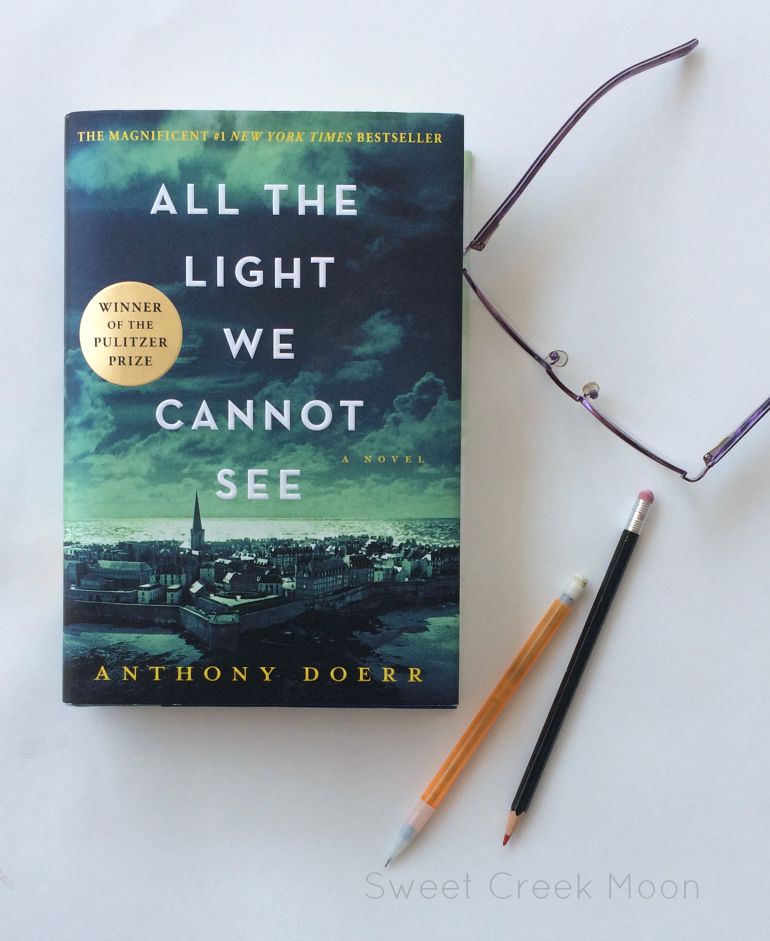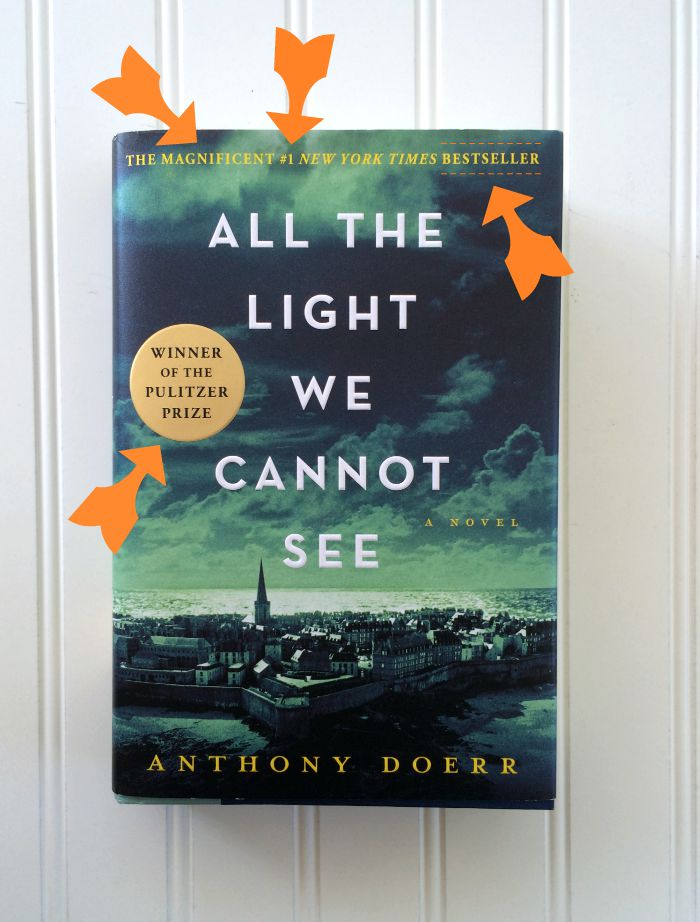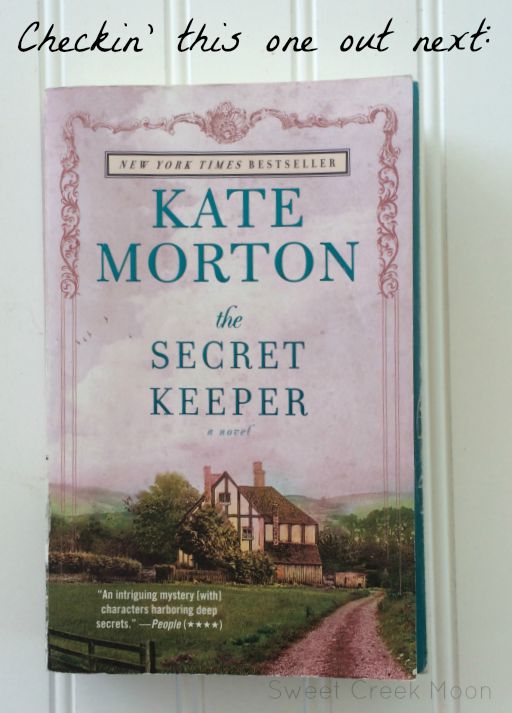All the Light We Cannot See
Book Review: All the Light We Cannot See
I have rather wonderful memories of my sisters and I climbing the stairs into the bookmobile [that magical wonderland on wheels] checking out as many books as we were allowed [I think it was 13–each] and then making our way home to read. We’d select our treasures on a Friday after school and read [devour] them by Sunday night. I’d finish my pile of 13 and then switch with another sister who’d finished her pile of 13 and then rotate again with another sister until we’d read them all.
When I was in 7th grade, the school had a reading contest and naturally we wanted to be part of it. It didn’t occur to any of us that reading as quickly and as much as we did was in any way unusual. Because someone on the faculty or someone in the community owned an ice cream shoppe, the prizes would be coupons for ice cream treats.
The teachers made a huge empty paper ice cream dish for each classroom. A construction paper scoop of ice cream represented one book. The students wrote down the name of the book, how many pages there were in it, and the name of the author. We stapled the scoops of ice cream into the empty ice cream dish. It was a great idea.
[Those books we would read by the dozens over the span of a weekend weren’t picture books — they were chapter books — and reading as quickly as we did was one of the things we had going for us as kids. We were great at it. We moved around so many times that I don’t recall the names of places, teachers, schools, friends, la-la-la-la-la. There wasn’t much of an opportunity to be great at anything except being the new kids on the block.]
The contest was announced on a Friday. We eagerly visited the bookmobile and ran home with visions of ice cream scoops dancing in our heads.
When we returned to school the following Monday, I remember eagerly grabbing a handful of construction paper scoops and writing all that information we were supposed to have. I don’t know exactly when I became aware of the comments that some of the other students were making–I was so thrilled about the possibility of magically being one of the winners in my classroom and getting to pick a special ice cream treat.
“You didn’t read that many books.” “You cheated.” You know the things kids will sometimes say.
I remember that the teacher took my scoops off of the bulletin board and explained that there was a special prize for me because I was such a good reader. I wouldn’t need to put my scoops on the bulletin board anymore.
[I don’t remember when it became clear to me that it was overwhelming to the other students. Who would want to even try? It seems to be that the teacher handled it rather remarkably, otherwise my memory would be viewed through the lens of embarrassment or shame or something.]
The special prize? A banana split.
A banana split!
[The crowd cheers!]
That’s three scoops of ice cream and a whole bunch of other stuff.
Boom.
My sisters received the same kind of special prize that I did, if I remember correctly.
[If I don’t remember correctly, I’ll edit.]
We read everything we could get our hands on: encyclopedias, dictionaries, sets that Mom and Dad would purchase of the classics. It didn’t ever seem like it was any kind of big deal. Mom was a reader. Dad was a reader. Naturally, we were readers, too.
No screens competing for our attention. Just read.
I love to read and am determined to read more than I have been.
I’m starting a book club of one — moi.
And when the last page is read, I’m going to be a brave little cabbage head and review it.
Brave because it’s not a skill I have — the writing part. The reading part I have down.
This book came to me with the highest recommendations.
All the Light We Cannot See by Anthony Doerr
It’s tough to write a negative review (especially a first one) about a book loved and appreciated by so many people.
It’s not that I’m disappointed that I read the story, because I’m not.
It’s a purposeful and earnest attempt to tell a story about an unforgettable, not entirely understood, and staggeringly wretched point in time. With that as a backdrop, I expected the characters to develop into something as unforgettable. The characters were more narrow or smaller than the circumstances they were in.
It seemed like they should occupy at least as much space in my heart and head as the history the novel is written around and through. I wanted to know more about what compelled them inwardly to make the choices they did.
[In a novel that is 530 pages long, there is plenty of paper time for that.]
On another note, Doerr clearly did his homework.
Clearly.
He knows the history. He knows the science. His descriptions of place, scenery, mechanisms, movement, physical surroundings is remarkable. Even then, though, there were times when the description of physical surroundings took precedence over the people that were in it. And wow with the sentences as long as a football field. Every noun paired with an accurate (though sometimes dull) adjective in an endless roll.
“In the lurid, flickering light, he sees that the airplane was not alone, that
the sky teems with them, a dozen swooping back and forth, racing
in all directions, and in a moment of disorientation, he feels that he’s
looking not up but down, as though a spotlight has been shined into
a wedge of bloodshot water, and the sky has become the sea, and the
airplanes are hungry fish, harrying their prey in the dark.”
Page 91
“The notion occurs to her that the ground beneath
Saint-Malo has been knitted together all along by the root structure
of an immense tree, located at the center of the city, in a square no
one ever walked her to, and the massive tree has been uprooted by the
hand of God and the granite is coming with it, heaps and clumps and
clods of stones pulling away as the trunk comes up, followed by the
fat tendrils of roots — the root structure like another tree turned upside
down and shoved into the soil, isn’t that how Dr. Geffard might have
described it? — the ramparts crumbling, streets leaking away, block-long
mansions falling like toys.”
Page 96
[Those are not the only examples but they are two that I remember because of how many times I read them trying to figure out the time thing.]
It took nearly 150 pages before I stopped wanting to put the book down and walk away. I was baffled by the truncated chapters and the persistent time leaps. It seemed as if something was left out of the story and the author didn’t want to weave it into the story so he flung himself backwards. I found myself going back to check the date because the information wasn’t making sense.
You’re throwing virtual tomatoes, aren’t you?
~sigh~
But that’s my review and I’m sticking to it. I can’t be the only person I know who didn’t like it. Right?
Okay, one more thing.
[Two more things.]
I don’t know why the von Rumpel story is even included.
A lesson or two in French would have been delightful.
Anthony Doerr is clearly a gifted writer and I applaud this obvious labor of love.
If you’d like to know why he chose the title, the characters and his motivation, you’ll be interested in this.
Yes, yes, yes I realize that it’s easier to review a book than it is to write one.
“If only life were like a Jules Verne novel, thinks Marie-Laure, and
you could page ahead when you most needed to, and learn what will happen.”
Page 292
I very much wanted to page ahead for most of the book — not to learn what would happen but so that I could finally put it down.
Wanting to page or chapter skip is not my favorite way to read a book.
Forgettable and it shouldn’t have been.
That is all.
Except for this.
If you do have any comments to make don’t be swearing.
~grin~






what do you think?